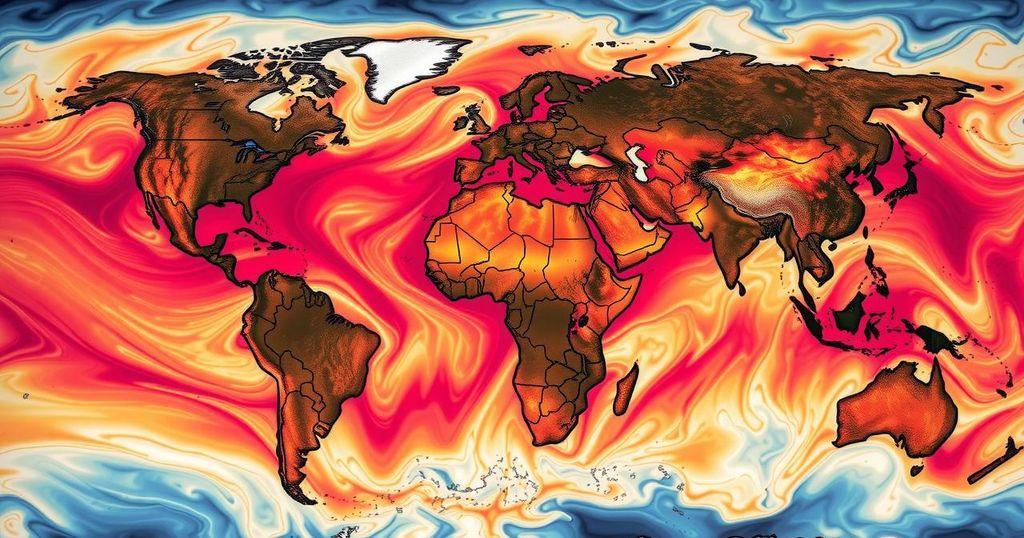Weather
AFP, AFRICA, ASIA, BEIJING, CHINA, CHINA METEOROLOGICAL ADMINISTRATION, CHONGQING, CLIMATE, EUROPE, EXTREME WEATHER, GLOBAL WARMING, GUANGZHOU, KENYA, MEXICO, NORTH AMERICA, PHILIPPINES, SICHUAN, SOUTH AMERICA, SPAIN, SWISS RE, UNITED NATIONS, UNITED STATES, WEATHER, WEATHER AGENCY BEIJING, WILDFIRES, YANGTZE RIVER
Aisha Khan
0 Comments
China Records Hottest Year on Record Amid Global Climate Crisis
The China Meteorological Administration announced that 2024 was China’s hottest year on record, with an average national temperature of 10.92 degrees Celsius, marking a worrying trend linked to climate change. The year witnessed numerous extreme weather events, including deadly floods and record heat, reflecting broader global climate issues and significant economic repercussions totaling approximately $310 billion in damages.
According to the China Meteorological Administration, 2024 marked the hottest year on record for China, with an average national temperature of 10.92 degrees Celsius (51.66 degrees Fahrenheit). This temperature exceeded the previous average by 1.03 degrees and underscored a troubling trend recognized globally. The agency highlighted that the last four years have been the warmest on record, a consequence of climate change, which has catalyzed extreme weather events worldwide.
Throughout 2024, China witnessed unprecedented weather patterns, including the hottest months ever recorded. The United Nations stated that 2024 is likely to be the warmest year globally. Rising temperatures contribute significantly to severe weather phenomena, with warmer air capable of holding more moisture and leading to intense storms and greater rainfall. This escalation in extreme weather not only leads to human tragedies but also affects crop yields and property, resulting in substantial economic impact.
Flooding in various regions of China resulted in numerous fatalities and widespread evacuations. The collapse of a highway in southern China due to relentless rain claimed the lives of 48 individuals, while residents of Guangzhou endured an unusually lengthy summer, with temperatures surpassing 22 degrees Celsius for an unprecedented 240 days. Other regions, such as Sichuan and Chongqing, faced harsh conditions of heat and drought.
Globally, the year also recorded severe flooding in Spain and Kenya, ferocious storms in the United States and the Philippines, and parched conditions and wildfires across South America. Insurance reports indicated that natural disasters inflicted approximately $310 billion in damages during 2024, illustrating the rising financial toll of climate-related calamities.
The 2015 Paris Agreement set forth ambitious targets to mitigate global warming below two degrees Celsius compared to pre-industrial levels, with an ideal aim of limiting it to 1.5 degrees Celsius. As noted by the World Meteorological Organization, the global mean surface air temperature from January to September of 2024 was recorded at 1.54 degrees Celsius above the pre-industrial baseline as measured between 1850 and 1900.
The increasing global temperatures fueled by human activity, particularly the burning of fossil fuels, have resulted in significant climatic changes worldwide. China, as the world’s foremost emitter of greenhouse gases, plays a critical role in these trends. The commitments made by the Chinese government to peak emissions by 2030 and achieve net zero by 2060 are essential steps in addressing climate change. Understanding the implications of these actions and the resulting weather patterns is crucial for global environmental efforts.
In summary, 2024 has been confirmed as China’s hottest year on record, reflecting a broader trend of rising global temperatures and extreme weather phenomena driven by climate change. The devastating impacts, including widespread fatalities from flooding, record-breaking temperatures, and substantial economic losses, highlight the urgent need for effective climate action globally. The effects of these temperature increases extend beyond mere statistics, affecting lives, economies, and the environment at large.
Original Source: www.rfi.fr




Post Comment